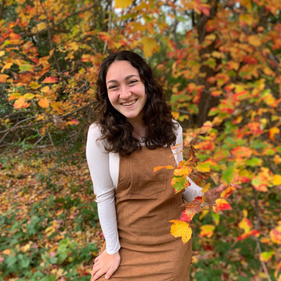Creating a Home for Myself and Others at Hillel

Growing up in the suburbs of Chicago in a Conservative, non-observant Jewish family, I never thought keeping Shabbat was something I would do. I couldn’t imagine losing a day to do homework, go out with my friends, or use my phone.
Living in Jerusalem, though, made me completely rethink what was possible for my Shabbat observance.
After graduating high school in 2019, I moved to Israel for a year. The hostel I lived in, the streets I walked on, and my entire schedule was built around Shabbat observance. Suddenly, keeping Shabbat didn’t seem impossible.
Empowered by experiences from my first semester in Israel, I decided to give Shabbat a chance. I woke up early one Saturday morning and walked to services, shared Shabbat lunch with my friends, and spent the afternoon taking on as many Shabbat-friendly activities as I could, like playing cards and strolling around a nearby park.
Though it wasn’t easy to change up my routine, I found that I really loved being able to take walks, read books, and enjoy time with friends. Despite keeping myself busy for most of the day, I ended that Shabbat more refreshed and ready for the week than I had ever been.
From that Shabbat onward, I became committed to exploring and growing my practices in Israel. Shabbat became a refuge and a time to relax — what Abraham Joshua Heschel calls “a palace in time.”
When I came home in spring 2020, I had to quarantine without my friends and support system around me. However, I still held onto my Shabbat traditions, despite the challenges that accompanied losing the Shabbat-observant setting and community I had come to rely on.
As I prepared to start college at Brandeis University, I already knew that Jewish resources on campus were going to play a crucial role in my social and religious journeys. Since my first day on campus, Brandeis Hillel has remained committed to providing COVID-safe opportunities to enjoy Shabbat dinner, tefillot (prayers) for Jewish students of all backgrounds, and holiday celebrations that bring us together.
I never had to worry about the availability of kosher food at an event or having a space for me to say Havdalah. I never worried that I couldn’t be a part of Hillel because I was more or less observant than my peers. In fact, I’ve been able to keep a stricter level of kashrut (Jewish dietary laws), attend more prayer services, and learn from others about Jewish practices I’d never even heard of because of the resources at Brandeis Hillel.
As I’ve continued on my journey, I’ve discovered the importance of creating a space where students of all backgrounds and practices can be Jewish together.
Stepping into leadership roles at my Hillel has enabled me to play a part in making our space more accessible for Jews of all backgrounds. At Shabbat dinners, we make sure to put booklets on the tables for students who need to say Birkat Hamazon (Grace After Meals), set up handwashing stations, and print out prayers.
The moments when I am most conscious of religious pluralism come during announcements at Shabbat dinner, where my job is to explain how to participate in singing Shalom Aleichem and Kiddush (the blessing over the wine) as well as to direct anyone to resources throughout the room that will make their Shabbat dinner meaningful.
Every week, I ask myself what I’m doing to encourage all forms of Jewish connection. Are we defining Hebrew terms during announcements? Are we choosing to sing songs that resonate with a variety of audiences? By taking extra care to formulate our Jewish spaces around diverse needs, I will continue to encourage my peers to explore their Judaism in every way that resonates with them.
Judaism was made accessible to me throughout my first few semesters of college, allowing me to learn and grow Jewishly, and it has been such a rewarding experience to create a space for others to do the same.
Samantha Brody is a sophomore at Brandeis University.